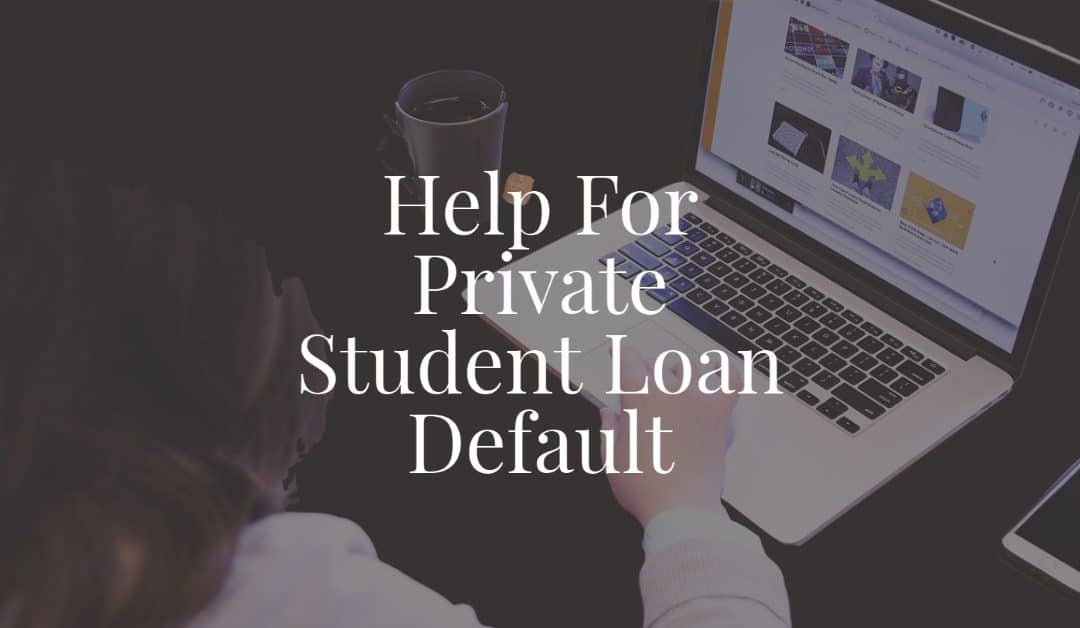College students often take out Federal loans because of low interest rates and fair terms. There are no definitive programs for deferment, forbearance, cancellation, or affordable repayment rights with a private student loan. It is also more likely that you get a predatory loan when you borrow outside the federal system.
If you have a private student loan, there is no safety net if you have a few rough months financially. Let’s look at what happens when you default with a private student loan and what you can do about it.
Predatory Private Student Loans
Banks, non-profits, nonbanks, and higher education institutions, including for-profit schools, offer private education loans that are typically used to cover the shortfall between the cost of higher education programs and financial aid, grants, and loans from the Federal government programs.
If you have a private loan, the chances are good that your interest rates are high and the terms of repayment are difficult for you to meet right out of college. Also, the lenders often tack on exorbitant fees, and you may even be charged for collections if you go into default.
The Truth in Lending Act (TILA) imposes requirements on lenders for private education loans. They are required by law to include disclosure of terms and interest rates and credit your payments correctly. It is important to read the terms and conditions carefully before taking out a loan, but if you are in default now, find your contract and read about what you signed up for. Knowledge is the key to finding your way out of a predatory loan.
What Causes Default?
Contracts vary the reasons they may consider you to be in default. Each contract has its own legal wording, but any one of these situations can often cause you to go into default on your student loans:
- You quit sending your monthly payment.
- You quit fulfilling other conditions of the contract.
- You start a bankruptcy proceeding (private education loans are generally non-dischargeable in bankruptcy unless you can show undue hardship)
- The lender finds that you falsely declared statements in your initial application.
- You falsely declare you are meeting other conditions of the contract.
- You are in default on other loans with the same lender.
Once you are in default with a private loan lender, your credit my crash, so finding out what to do next is crucial. First, call your loan servicer to ask whether they offer any programs to help you pay at a slower rate so that you can come back from default. Ask about what the requirements are. Some lenders do offer programs, but the majority do not.
It is important to immediately try for a repayment program because, after 120 days of missed payments, most lenders will sell your debt to a debt collection agency. Once this happens, you are in default and unlikely to get out of it easily.
What You Can Do In Default
If you are in default and receive a letter demanding payment, there are a few ways that you can fight this battle.
- Call the servicer and find out who owns your loan. Often, loans are sold to other entities like student loan trusts. These other silent banks and trusts are often called depositories.
- Discuss possible repayment plans or any settlement options they might consider.
- Require an account payment history to verify the date of your last payment. This is a way of making sure they are actually tracking your payments properly.
- Ask for a chain of service document. Often, students borrow from Chase or Discover Bank only to find that some other bank or student loan trust now owns their loan. This type of bank or trust is called a depository. They own your loan but generally do not accept your payments or interact with you in any way. They pay your servicer to interact and accept your payments.
- Require a copy of proof that you owe the debt in the form of your original signature page. Many depositories lost lawsuits against a student because they could not legally prove that they owned the debt.
- Also, ask for proof of who has owned your debt since the beginning. When the depository cannot prove the entire chain of assignment documentation, they were also defeated in court.
- If you have been in default for a while, look up your state’s statute of limitations. If your statute of limitations has run out, you no longer owe the debt, regardless of whether they keep contacting you. By law, they must stop contacting you if you have reached the statute of limitations.
- If you go through bankruptcy, don’t let your lender charge you for the debt that was discharged under your bankruptcy suit.
Find Help
Oftentimes, predatory lenders will not take you seriously without the threat of a lawsuit. You can contact our experienced consumer protection attorneys here at LawZebra for a free consultation. Find out whether your lender is acting illegally to keep you a slave to your debt. If there is a fraudulent claim perpetuated by a student loan trust, we know the defenses that can successfully help you. With our expertise, you can find your way out from under the heavy load of debt for your education. Contact us and get started finding your freedom again today.

